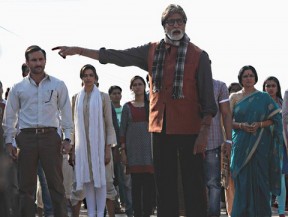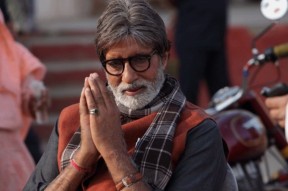First things first. This is not the first time Prakash Jha has made a film on education. He made Hip Hip Hurray (1984), possibly the first Indian sports film set in a school. It was among other things, a comment on the equation between students and teachers. He never was a creative opportunist. Or someone who seeks issues only to create controversy and debate. He has made films like Damul (on bonded labour), Gangaajal (criminalisation of the police system) and Mrityudand (suppression of women by feudal mindsets), Rajneeti and many more to speak about issues that must be debated. The artistic merit of his cinema can be debated but never his motives. So to say that the title of his latest film and the controversy around it has anything to do with a publicity gimmick would be unfair to his body of work. Yes, Aarakshan is not just about reservation. Reservation is just a nodal point from where many kinds of sub stories and issues erupt in the film.
Yes, it does not offer any pat answers to solve the conflict between merit and social inequity but then it is not meant to. What the film does attempt infact and quite earnestly, is to show many sides of the debate. An economically challenged Hindu student struggling to fight the tyranny of cut off marks and quota politics. A Dalit who thinks a country that has denied generations of young children an equal right to dignity and education, must now pay up. Even if hurts. Those who think merit must be earned. Those who despite being meritorious are victimised by the nexus between power, money and greed and a vitiated and corrupt education system.
But most importantly, this is the story of a man who believes that education is the answer to every conflict. That if education is imparted to everyone in this country without discrimination and without money controlling its quality, we will empower every young student and hopefully rise above even the need for a quota system.
What the film does not fully address is how politicians in India play fast and loose with reservation quotas to gain vote banks and how their intention is to not educate but to gain power. But the film is still an earnest attempt to understand the many kinds of Indias struggling to gain admission into a life of privilege. In elite colleges. And in the wake of barefaced police firing at retreating farmers in Maval near Pune, not untimely because the scene where bull dozers powered by political might, police and money arrive to destroy a humble resource centre is not just a celluloid device but a possibility. Maybe a reality in a country where land is being gobbled up by a few and millions are being dispossessed. The biggest point the film makes is however against the marketing of education in coaching schools that hard sell the idea of success in examinations but teach nothing of value.
That said, this is not an explosive film. It really is a gentle film about idealism and humanity. Not exceptionally brilliant, quite a bit jerky in places and was on a Saturday morning, being watched by a bunch of derisive teenagers who did mock clapping everytime someone said a dramatic line. It is not Jha’s best work. The dance sequence in a Dalit neighbourhood is awkward, tuneless and unnecessary. And you never forget that this is a film, not a real story being lived by someone but still it is the kind of cinema that should be made because it is about heroism that is fast becoming obsolete today in both cinema and in life.
Like the beautiful Tanvi Azmi says about her stubbornly idealistic husband, “In a world full of cowards, he is real hero.” And he is. Not because what he professes is the ultimate truth but because he has the courage of conviction to leave a job he loves for what he believes in. Because even when his generosity is used against him, he will not stoop to violence and will fight back with the only thing he knows. The ability to teach and transform lives.
The climax may appear naive in our cynical times but every initiative that changes lives begins with a naive hope that things can be changed.
The film is also a celebration of the gentler, quieter Amitabh Bachchan who still makes you marvel at his tireless commitment to his craft. Who still hugs a daughter, helps a student, stands up to a bully, walks through his pain in the rain towards the birth of a new dream as if he were doing it for the first time. As Dr Prabhakar Anand, he owns your mind space even though he has played similar upright characters in Dev, Khakhi and many more films.
Saif Ali Khan though given a few sequences to shine in has little to do and has not been detailed enough to look or sound like someone who has seen a lot of struggle. His Langda Tyagi remains an unsurpassed memory as far as inner and outer merging into a character goes. Deepika Padukone’s best moments are when she emotes through her silences and her deep, shuddering tears. Her dialogue delivery is a bit weak but still far more effective than many of her peers who are given many more grace marks for doing much less. Prateik Babbar who looked like a lost raindrop, vulnerable, sunlit and beautiful in Dhobi Ghaat is dressed awkwardly and does not have a lot to impress us with. He obviously looks unconvinced by what he is doing and is an instinctive actor who can pull off only what he identifies and feels for.
Manoj Bajpayee is a worthy counterpoint to the heroic Bachchanisms, though seems like caricature than a real person in places. The film lacks the energy and power of some of Jha’s earlier works. It also reminds you of the lone warrior played by Dilip Kumar in films like Shakti and Mashaal. The music does not really register instantly, the plug for Century Ply of all things, is a bit jarring but the story has far more to say than can be heard hurriedly.
The screenplay by Anjum Rajabali and Jha and the dialogues have been invested with many layers of thought but without violence, gratuitous sex or incendiary dialogues, it may grow on its audience slowly. Not instantly because lets face it. The age of old fashioned heroes is gone. The battles that interest us today are between evil and the lesser evils. We no longer clap for a 60-year-old-man teaching his impoverished students in a cow shed. We laugh. We want a 40-something star shaking his biscuit in our faces instead. But here is a hope that Jha will not dilute his cinema further to appease the market forces and will continue to make the films he believes in. Even he connects with only a few of us, it will still be something worth waiting for.
Reema Moudgil is the author of Perfect Eight (http://www.flipkart.com/b/books/perfect-eight-reema-moudgil-book-9380032870?affid=unboxedwri )









Wunnerful read, Reema. Especially about contextualising Jha himself. Cinematically, I never found Jha to be consistent.
Hip Hip was something I wouldn’t have seen a second time, but Damul was way out. The Damul kind of cinema died in the 80s itself.
To me, Jha yet to discover his cinematic idiom.
This review is as amazing as all your other reviews Reema. Brilliantly worded.
amazing, Reema